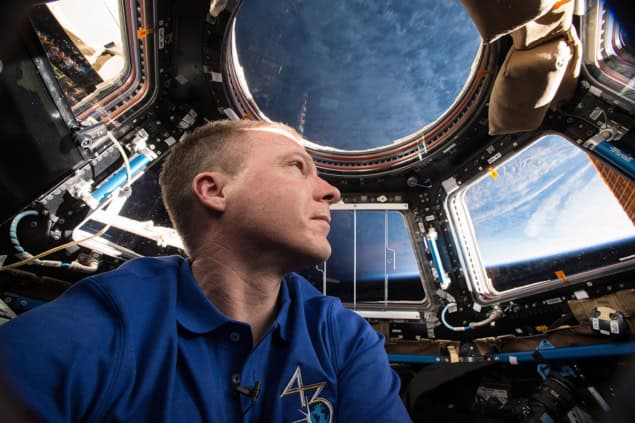Kate Gardner reviews the novel Orbital by Samantha Harvey

Every day the International Space Station (ISS) orbits the Earth 16 times. Every day its occupants could (if they aren’t otherwise occupied) observe each one of our planet’s terrains and seasons. For almost a quarter of a century the ISS has been continuously inhabited by humans, a few at a time, hailing from – at the latest count – 21 countries. This impressive feat of science, engineering and international co-operation may no longer be noteworthy or news fodder, yet it still has the power to astonish and inspire.
This makes it an excellent setting for a novel that’s quietly philosophical, tackling some of the biggest questions humanity has ever asked. Orbital by British author Samantha Harvey follows four astronauts and two cosmonauts through one day on the ISS. It is an ordinary, unremarkable day and yet their location makes every moment remarkable.
We meet our characters – four men and two women, from five countries – as they are waking up during orbit 1 and leave them fast asleep in orbit 16. Harvey has clearly read astronaut accounts and studied information available from NASA and the European Space Agency. She includes as much detail about life on the ISS as a typical popular-science book on the subject.
These minutiae of astronaut tasks are interspersed with descriptions of Earth during each of the 16 orbits, as well as long passages deliberating everything from whether there is a God and climate catastrophe to global politics and the futility of trying to understand another human being.
The characters going about their tightly scheduled day in Orbital are individual people, each with their own preoccupations, past and present. While they exercise and perform maintenance tasks, science experiments and self-assessments, their thoughts roam to give us an insight that feels as true as any astronaut memoir. One character muses on the difficulty of sending messages to her loved ones, feeling that everything she has to say is either hopelessly mundane or so grandiose as to be ridiculous. I don’t know if an astronaut on the ISS has ever thought that, but for me, it perfectly encapsulates their situation.
The ISS’s orbit 400 km above Earth is close enough to see the topography and colours that pass beneath, but far enough that signs of humanity can only be inferred – at least in daylight. This doesn’t stop the characters from learning to see the traces of humans: algal blooms in oceans warmer than they once were; retreated glaciers; mountains bare of snow that were once renowned for their white caps; absent rainforest; reclaimed land covered by acres of greenhouses.
It’s a curious choice to set a book on the ISS that isn’t science fiction. It’s fiction, yes, and certainly based in the world of science, but the science it depicts isn’t futuristic or even particularly cutting-edge. The ISS is now quite old technology, nearing the end of its remarkable life, as Harvey points out in an insightful essay for LitHub. Its occupants still do experiments to further our scientific knowledge, but even there what Harvey describes is sci-fact, not sci-fi.
In her LitHub essay, Harvey says it was precisely this “slow death” of the ISS that appealed to her. The ISS is almost a time capsule, hearkening back to the end of the Cold War. It now looks likely that Russia will pull out – or be ejected – from the mission before its projected end date of 2030.
Viewed from the ISS, no borders are visible, and the crew joke comfortably about their national differences. However, their lives are nevertheless dictated by strict and sometimes petty rules governing, for example, which toilet and which exercise equipment to use. These regulations are just one more banal reality of life on the ISS, like muscle atrophy, blocked sinuses or packing up waste to go in the next resupply craft.
Just consider the real-life NASA astronauts Suni Williams and Butch Wilmore, whose stay on the ISS has been extended following problems with the Boeing craft that was supposed to bring them home in August. Having two extra people living on the space station for several months longer than planned is an intensely practical matter, made easier by such innovations as the recycling of their urine and sweat into drinking water, or that astronauts must swallow toothpaste rather than spit it out.
Harvey manages to convey that these details are quotidian. But she also imbues them with beauty. During one conversation in Orbital, a character sheds four tears. He and a crew mate then chase down each floating water droplet because loose liquids must be avoided. It’s a small moment that says so much with few words.
Orbital has been shortlisted for both the 2024 Booker Prize (winner to be announced on 12 November) and the 2024 Ursula K Le Guin Prize for Fiction (the winner of which will be announced on 21 October). The recognition reflects the book’s combination of literary prose and unusual globe-spanning (indeed, beyond global) perspective. Harvey’s writing has been compared to Virginia Woolf – a comparison that is well warranted. And yet Orbital is as accessible and educational as the best of popular science. It’s a feat almost as astonishing as the existence of the ISS.
- 2024 Vintage 144pp £9.99pb
